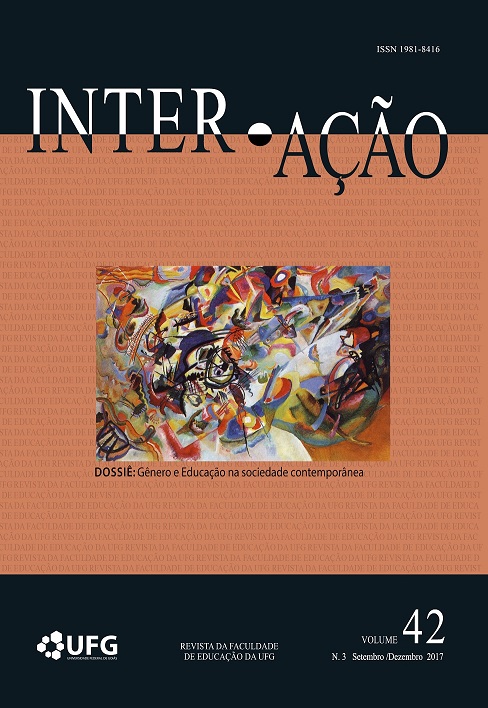A EDUCAÇÃO FEMININA NA FRONTEIRA DA AMAZÔNIA: ESCOLAS PARA AS MULHERES NO EX-TERRITÓRIO FEDERAL DO AMAPÁ (1949-1964)
DOI :
https://doi.org/10.5216/ia.v42i3.48965Mots-clés :
Estado. Igreja Católica. Educação Feminina. Cultura Escolar. Habitus.Résumé
O presente trabalho contextualiza o debate sobre a educação feminina no Brasil e no Amapá, conjugando a pesquisa bibliográfica e a empírica, utilizando metodologia da História Oral, em análise às entrevistas semi-estruturadas, concedidas por 9 ex-alunas da Escola Doméstica de Macapá, além dos relatos da 10ª egressa, condensados em uma autobiografia. Apresenta um dos resultados da dissertação de mestrado “público/confessional, cultura escolar e formação de habitus: a Escola Doméstica de Macapá/AP (1951-1964)”, versando sobre a incorporação de habitus por meio da cultura escolar da referida escola. O embasamento teórico reveste-se do conceito de habitus, de Pierre Bourdieu, e de cultura escolar, de Dominique Julia.Téléchargements
Téléchargements
Publié-e
Versions
- 2026-02-02 (2)
- 2017-12-05 (1)
Comment citer
Numéro
Rubrique
Licence
© Revista Inter Ação 2018

Cette œuvre est sous licence Creative Commons Attribution - Pas d'Utilisation Commerciale 4.0 International.
A Inter-Ação utiliza como base para transferência de direitos a licença Creative Commons Attribution 4.0 para periódicos de acesso aberto (Open Archives Iniciative - OAI). Por acesso aberto entende-se a disponibilização gratuita na Internet, para que os usuários possam ler, baixar, copiar, distribuir, imprimir, pesquisar ou referenciar o texto integral dos documentos, processá-los para indexação, utilizá-los como dados de entrada de programas para softwares, ou usá-los para qualquer outro propósito legal, sem barreira financeira, legal ou técnica.
Autores que publicam neste periódico concordam com os seguintes termos:
1) Autores mantém os direitos autorais e concedem à revista o direito de primeira publicação, com o trabalho simultaneamente licenciado sob a Licença Creative Commons Attribution que permite o compartilhamento do trabalho com reconhecimento da autoria e publicação inicial nesta revista.
2) Autores têm autorização para assumir contratos adicionais separadamente, para distribuição não-exclusiva da versão do trabalho publicada nesta revista (ex.: publicar em repositório institucional ou como capítulo de livro), com reconhecimento de autoria e publicação inicial nesta revista.
3) Autores têm permissão e são estimulados a publicar e distribuir seu trabalho online (ex.: em repositórios institucionais ou na sua página pessoal) a qualquer ponto antes ou durante o processo editorial, já que isso pode gerar alterações produtivas, bem como aumentar o impacto e a citação do trabalho publicado.















